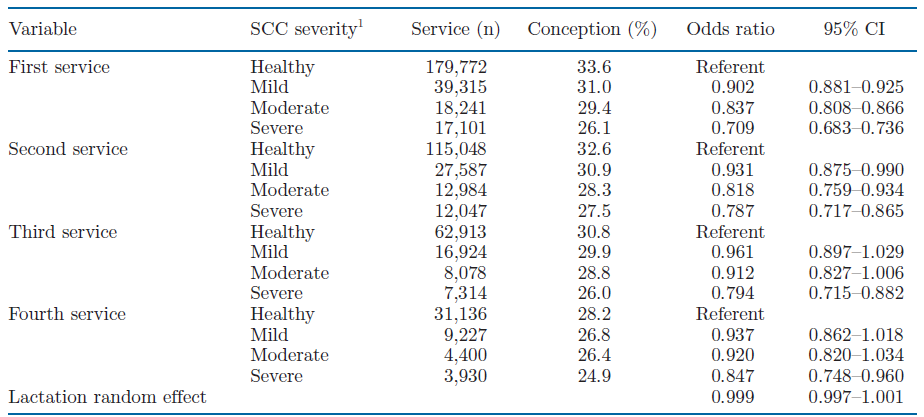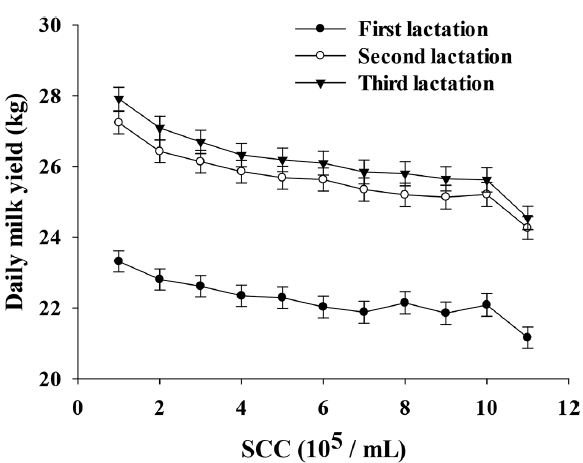We have always been told that a high somatic cell count (SCC) reduces the potential yield of our cows, but in the reality of farming how much is this actually true and does it have other impacts?
Well the answer can be found through an extensive study from Argentina where researchers collated 1,930,376 lactations from 867 grazing herds collected over a 14-year period. They took the data and drilled down into the associations between SCC, yield and fertility.
Fertility and Udder Health
Increasing SCC decreased conception rate (CR) – the higher the SCC, the greater the reductions in CR as shown Table 1. The negative association of SCC and fertility was found to be even stronger when high SCC occurred within 30 days of insemination but showed almost no association with services (i.e. heat detection). Effectively, an increase in SCC reduced conception rates by 22.3% - CR at first insemination of 26.1% when SCC exceeded 1,000,000/ml compared to 33.6% when SCC was below 150,000/ml.

Table 1. SCC association with conception rates for 566,017 services from 318,705 lactations
SCC severity: healthy, <150,000 SCC/mL; mild, SCC 150,000 - 400,000 SCC/mL; moderate, SCC between 400,000 -1,000,000 SCC/mL; severe, SCC ≥1,000,000 SCC/mL;
Milk Yield and Udder Health
Increases in SCC led to decreases in milk yield. This study showed that losses started from very modest SCC levels (around 100,000 SCC/ml) with the association stronger for older cows. For example, increasing from 50,000 to 200,000 SCC/ml led to a milk yield reduction of 0.75kg/day in heifers, but a reduction of 1.5kg/day in 3rd calvers (shown graphically in Figure 1).
Higher production cows suffered much more severe losses – for example cows in the top quartile for milk yield lost 23% more milk due to high SCC than cows in the bottom quartile.

Figure 1: Milk yield association with SCC for 29,830 lactations
We know that high production is only possible in the absence of stress and we know that stress can lead to immune suppression, and subsequent disease susceptibility. This study shows clearly the significant economic effects that compromised udder health can have – cows with high SCC are less productive and less fertile. Not only should every effort be made to maintain udder health through high standards of hygiene in the parlour and throughout the bedded areas of both milking and dry cows but there is clear proof that feeding our immune modulating product OmniGen AF has shown clear and positive benefits to cows subjected to stress and with clear proof of application for udder health.
Our European Immunity Challenge data took 244 herds in the UK, Netherlands, Belgium and France totalling 40,333 cows fed OmniGen AF for an average of 146 days and compared the health data of these herds with that of the previous same time period before they started to feed OmniGen AF. This data showed an average reduction in SCC of 48,000cells/ml and an increase in milk yield of 0.45kg/cow/day in the feeding period supporting the findings reported above. The cases of mastitis on these 244 farms were also reduced by 28% during the feeding period from 18.3% to 12.1%.
OmniGen AF also supports fertility as shown by a further study by Cassaroto et al reported in Animal and Feed Technology in 2020 looked at a large herd study at the University of Florida. This monitored 1392 multiparous cows, 706 fed 56g/cow/day of OmniGenAF from 60 days pe-calving to 150 days in milk (or confirmed pregnant), 686 fed the control diet with no OmniGen and found that conception at first service stood at 32.6% for OmniGen AF fed cows compared to 28.1% for control cows, an increase of 16%. Conception to second service was also improved, this time by 7.5% with a 25.8% conception rate compared to 24%. In all this led to a 10 day reduction in days to conception in OmniGen AF fed cows with reduced transition disease a key reason for this, whilst they also produced 0.7kg/cow/day more milk on average during the trial period.
Feeding OmniGen AF can help cattle be, and stay healthy with impacts on health, fertility and profitability – contact your local Dairy Area Representative today to learn more.
The paper can be found here:
Associations of somatic cell count with milk yield and reproductive performance in grazing dairy cows. R. Rearte, S. G. Corva, R. L. de la Sota, I. M. Lacau-Mengido, and M. J. Giuliodori, J. Dairy Sci. (2022) 105:6251–6260 https://doi.org/10.3168/jds.2021-21504
Subscribe to our blog updates and receive new blog articles in your mailbox.
